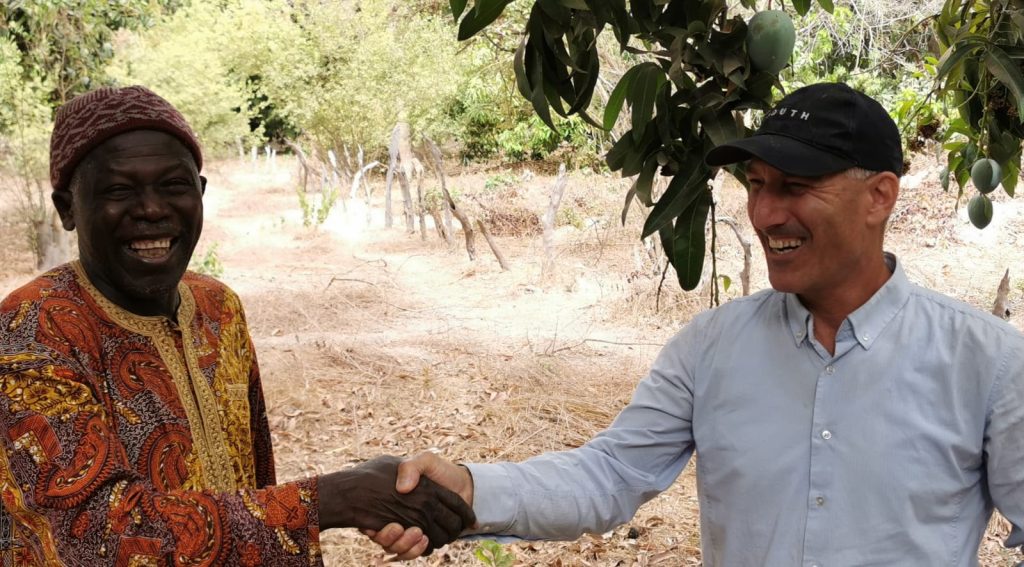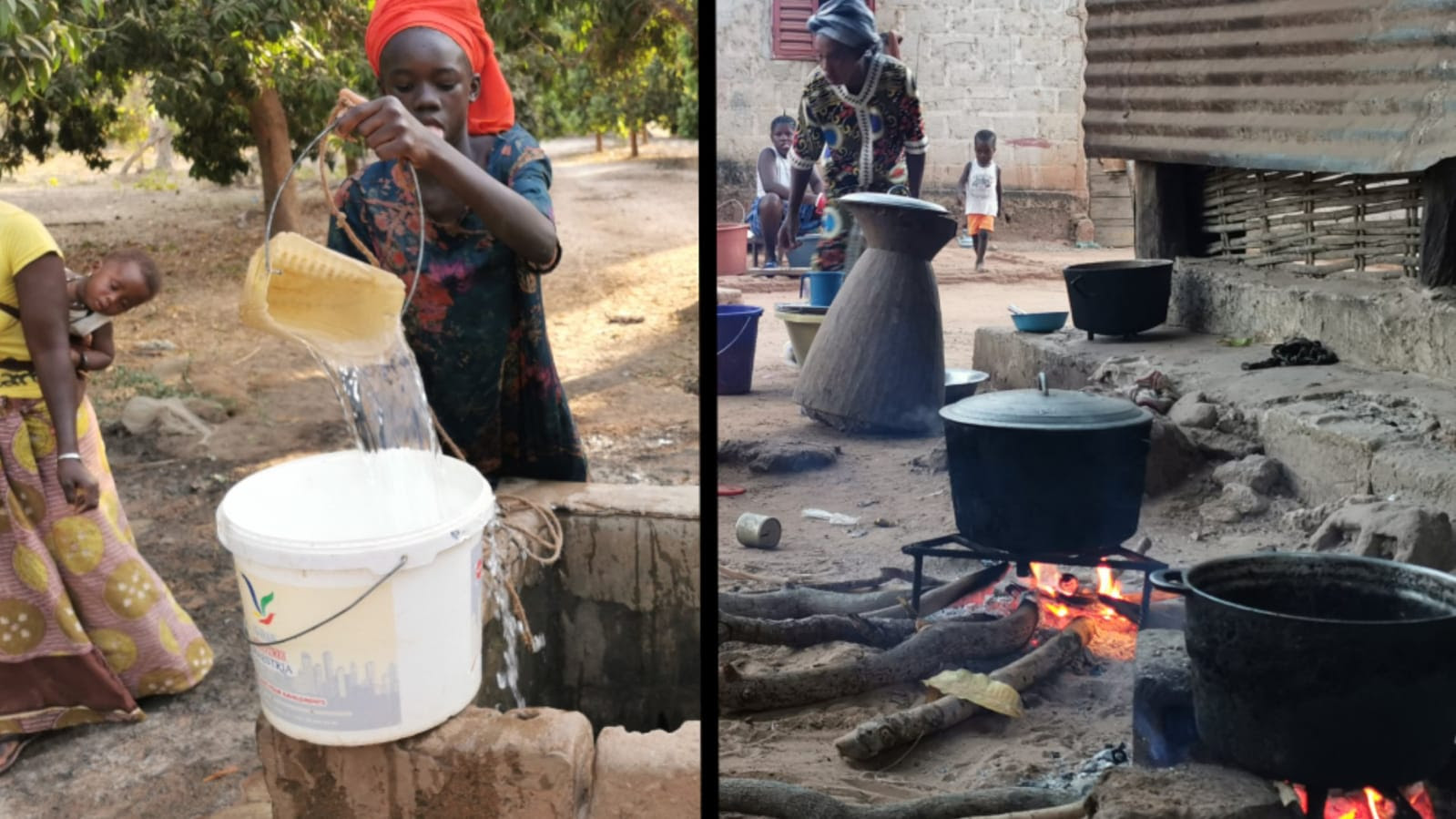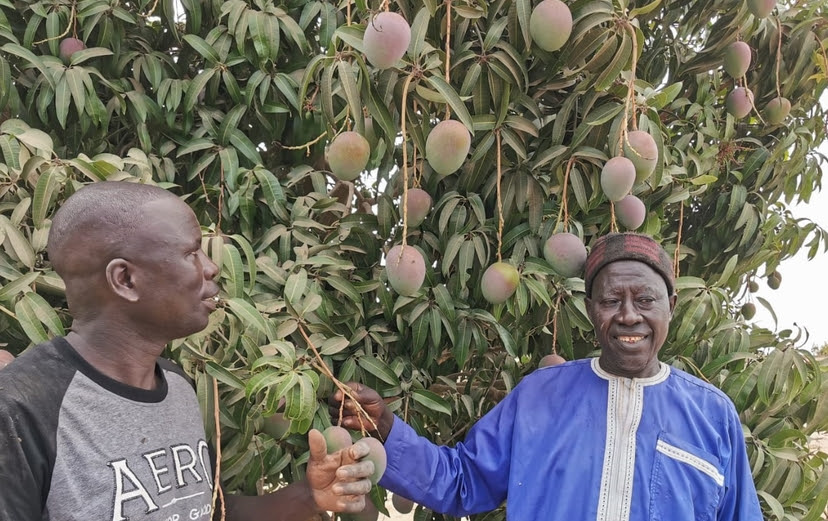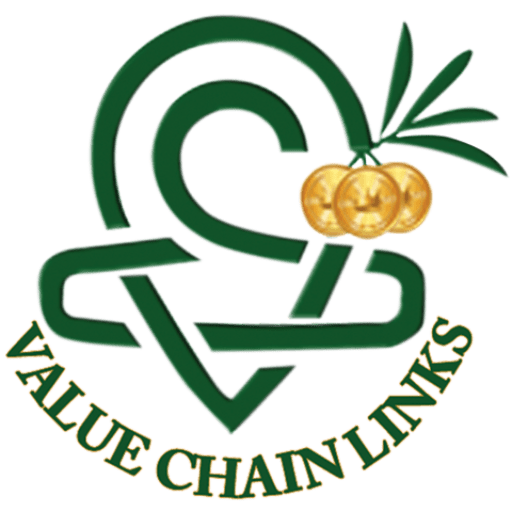THE PLACE OF “TRUST” IN CREATING A CHANGE

BY DR. NIMROD
Allow me to begin by addressing current affairs in Israel: At the moment, there is a war in Israel. I strongly oppose any violence and believe that peace, mutual trust, and respect are the solution to any disagreements.
The Green Valley team and I will continue to work with all our might to improve the lives of farmers wherever our help is needed and welcome. I am proud to be now in Senegal, a Muslim country, to promote the inspirations and hopes for a better world.
TWO WEEKS AGO, in a meeting with farmers from a village in south Senegal, the translator, who is a local teacher, approached me at the end of the meeting, saying,
“I noticed you repeatedly said “TRUST.” I see it is important for you. I wish you to know that WE TRUST YOU!” This is how the meeting ended.
I felt honored, blessed, but also with a heavier responsibility, to the sound of those powerful words; “We trust you!”
Earlier, in the meeting, the farmers shared the poor results received in previous projects, and hence their miss-trust of people and organizations suggested “help.” They are accustomed to and fed up with disappointments.
The farmers said, “These governmental and non-governmental organizations, experts, donations, funds, etc., come and go, but we remain poor! We have had enough of it. We desperately want and need a real solution for our professional and financial problems.”
The message repeated itself, in deferent words, by all farmers in all villages. When they spoke, I could see the mixed anger and shame when they related to the past results. Their eyes turned red, and they were holding their tears. One said, “They treat us as if we were not human and have no say.”
Then they said, “A sick person can’t cure himself. We are sick, and we need help!”
Ask yourself; how do you “cure” poverty of an entire village and many villages across Senegal, Africa, Asia, whose livelihood depends on agriculture?
How do you increase farmers’ income from 1-2 $/day to 10-20 $/day?
Will it take decades or maybe centuries?

FOCUS ON THE “WHAT”
Before we discuss or think of the solution to the poverty problem, let’s understand how farmers run their business today because obviously, it is not bringing them the expected results.
Today, before harvest, the traders approach the farmers with offers to purchase their yield. The farmers choose the trader who offers the best business terms.
The relationship of the traders and the farmers is based on “WHAT”; what you give me (mangoes), and what you get in return (money). It is a pure and straightforward business transaction.
In this business relationship attitude, the trader cares and focuses only on the produce and the farmer only on the money. That’s all.
Do you think there is interest for long-term commitment and investment between the parties under such circumstances and such a business environment?
Of course not, the farmers expect no strategic benefits or professional support from the traders, and indeed they receive none.
On the contrary, the traders look for every possible way to decrease their financial exposure and risk towards the farmers.
The reflection of the low trust is in farmers’ stories about traders who took their produce but failed to pay or paid not as agreed.
FOCUS ON THE “WHY”
In contrast to the above, Green Valley and I view farmers as the objective and primary component of our activities.
Let me clarify that the export of mangoes is not the objective; instead, it is the business means to improve farmers’ lives.
Both Green Valley and traders are doing business. The difference is that farmers and their wellbeing are the objectives of Green Valley activity, while the produce is the traders’ activity objective.
Hence, I made it my habit to meet and talk to the farmers in every village and introduce the Green Valley program.
In the previous column, I shared details about those meetings. Do we talk, in those meetings, about WHAT we will do or HOW will we do the project? NO.
So what do we speak about, and how do we build Mutual Trust & Respect?
In fact, during those meetings, we focus on the WHY.
While talking about the WHY, we also build our relations and increase our mutual trust and respect.
Why we do it this way? What is the WHY that guides us?
Because my goal is to improve farmers’ lives while still doing good business (for both sides), for me, good business is the result and not the purpose of the process and our business activity.
To improve farmers’ lives, we must work closely together, and for that, we need to know and learn to TRUST each other.

Green Valley’s Mission and Vision always guide us.
As the son of farmers, a former farmer myself, and one who worked his entire life with farmers, there is nothing more natural, pleasant, fun, and easy for me than talking with farmers.
I empathize with farmers; I understand them well, their pain, troubles, problems, hopes, and dreams.
Empathy is a required and essential “commodity” and a needed ingredient to work together effectively. And effective cooperation, based on mutual trust and respect, is a prerequisite for changing farmers’ harsh reality.
Note, the WHY, which we discuss in our meetings, are the farmers’ DREAMS.
REALITY CHECK AND THE STARTING POINT
This week I was in the Keur Mvire village in the Niayes region in Senegal. As I stroll around the mango orchards, I observed the gorgeous, stunning, perfect Kent variety mangoes.
If exported when perfectly mature, each mango holds the potential to improve the farmer’s livelihood and provide healthy food and happiness to the lucky consumer who will enjoy its fantastic taste.
In the Niayes region, the soil is sandy, and the weather is hot and dry for most of the year. I asked the farmers, “When the harvest comes, how many fruits out of ten will you market?”
The farmers were unsure about the exact answer; one said, “The fruit flies “steal” from me seven fruits so that I can market only three.” Another farmer said, “The fruit flies leave me only two fruits to market.” A third farmer said, “The fruit flies “steal” nine fruits, leaving me with only one fruit to market.”
In my head, this immediately translates to 70% to 90% fruit loss!
The farmers look very upset and angry with the fruit loss caused by the fruit flies.
The exact numbers, i.e., loss of 50% to 90%, I hear from other mango growers in different places in Senegal, Africa, and Asia.
What is the impact of such high fruit fly infestation on the farmers’ financial performance and livelihoods?
Let’s assume for a moment that if a farmer had harvested and exported all his fruits and sell them to the best export markets, for the best price, he would fetch 1,000$ per hectare. Hence, 1,000$ is the farmer’s maximum potential income per hectare.
But, in reality…
1) Because of the high fruit fly infestation, the mango growers harvest their produce early in the season before reaching its full size and maturity. Meaning, the farmer is losing at least 10% of the fruit size and weight. Now we are down to 900$.
2) Although harvesting early, fruit fly infestation is 50% to 80%. Even with “only” 50%, the farmer potential is now down to 450$.
3) Because of the high infestation, marketing is limited to(almost only)the low price local markets. Meaning, 20% to 80% (average 50%) lower price per kg versus export markets. Now the farmer’s potential is down to only 225$.
When we combine the above numbers, we see that practically farmers lose over 70% of their current potential income. Regardless of his high losses, the farmer’s 100% investment per hectare remains unchanged.
We should add to the above losses that the yield those farmers receive is only 5% to 25% of advanced mango growers’ (e.g., 0.3 to 10 tons/ha., VS. 30 to 60 tons/ha.).
If we calculate the low yield (average 90% less than advanced farmers) together with the rest of the losses, we will see that the farmer loses 90% and up to 99% of his income!
WHY is the difference in yield so big?
Because which investor will invest in a business that is regularly losing over 70% of its potential income and can’t get quality produce for high-value export markets (because of fruit flies)?
TAILOR-MADE BUSINESS MODEL
The Green Valley program and business model are now very different from how it started four years ago and even only a year. WHY?
This results from our field experience, which includes discussions with farmers and stakeholders, fieldwork, and constant improvements, during that period.
We translated the consolidated experience into practical changes to help the model better suit the reality of African farmers and stakeholders.
“TURNING LEMON INTO LEMONADE”
Like other emerging markets, Africa is full of limitations and challenges (problems) for foreign business partners, such as Green Valley.
I found out that the best way to cope with the above is by looking for the upside in every “limitation,” “problem,” and “challenge.”
Hence, in its updated, current configuration, the Green Valley program and business model “confront” the shortcomings and weaknesses of the African agro-sector, the way a chef would “turn a lemon into lemonade.”
The “lemonade” Green Valley creates is a sustainable advantage for African mango growers, value chain partners, and involved stakeholders.
As a result, this year, I see a clear and noticeable difference in the responses we receive from the farmers, value chain partners, and stakeholders.

The model is so attractive that in all meetings where I was present, the farmers chose to move forward with us and implement the Green Valley program.
At this stage, due to certain limitations, we could accept only a portion of the villages and farmers. Hopefully, next year we can add more villages and farmers.
“TRUST” IS BUILT ON ACTIONS
The list below explains why mango growers and value chain partners want to be part of the Green Valley program, trust us, and smile with hope.

BECAUSE A GREEN VALLEY PROJECT…  Trust & Respect* Starts by building mutual trust and respect.* Treats farmers and value chain partners as equal.* Treats others the way we like to be treated.* Encourages dreaming of the preferred future.* Self-respect: a business-oriented model and not a philanthropic one. Trust & Respect* Starts by building mutual trust and respect.* Treats farmers and value chain partners as equal.* Treats others the way we like to be treated.* Encourages dreaming of the preferred future.* Self-respect: a business-oriented model and not a philanthropic one. Funding* Zero (0) payment $$$ by local farmers and value chain partners.* Risk-free model for the farmers. Funding* Zero (0) payment $$$ by local farmers and value chain partners.* Risk-free model for the farmers.Business Model* Tailor-made model for emerging economies.* Design for mango growers who wish to export.* Support mango export value chain.* Enables to deliver and finance solutions to many problems (aside from fruit flies).* Focused on export to premium markets.* Connects all elements of the value chain; farmer to consumer. Professionally* Enables fast transition from agriculture to agro-industry.* Supply a FULL PACKAGE solution for farmers and value chain partners (e.g., financing, critical technologies, know-how, training, and implementation).* Brings novel protocols, including the FFCTZ for fruit fly management.* Results within the first season.* Supported by renowned experts.* Provides state-of-the-art technologies.* Develops local infrastructure and a team of experts.* Provides solutions to quantity (yield) and quality increase. Socially* The farmer stands in the center of the program.* Focus on increasing farmers’ revenue as a way to eradicate hunger and relate to other UN SDGs. Strategically and Commitment* Long-term, strategic thinking.* Ready to re-design and re-built the value chain. Marketing & Branding* Marketing of quality, high value-added fruits (starting with mangoes).* Marketing and branding are an integral part of the model.* Marketing tastier and better-looking mangoes.* Farmer is at the forefront – Emphasizing the people that grew the produce.* Enables significant extension of the mango marketing season. |
| TAKEAWAYS» FARMERS must take an active part in building the agro-industry in emerging economies. They are the critical element.» MUTUAL TRUST AND RESPECT is the necessary attitude on the path to changing farmers’ reality.» A BUSINESS MODEL designed for emerging economies is key to building a solid agro-industry in emerging economies and rehabilitate their economies. |
| Please, if you found value in this article, it would mean a lot to me if you send me a comment and share it with your friends. |
